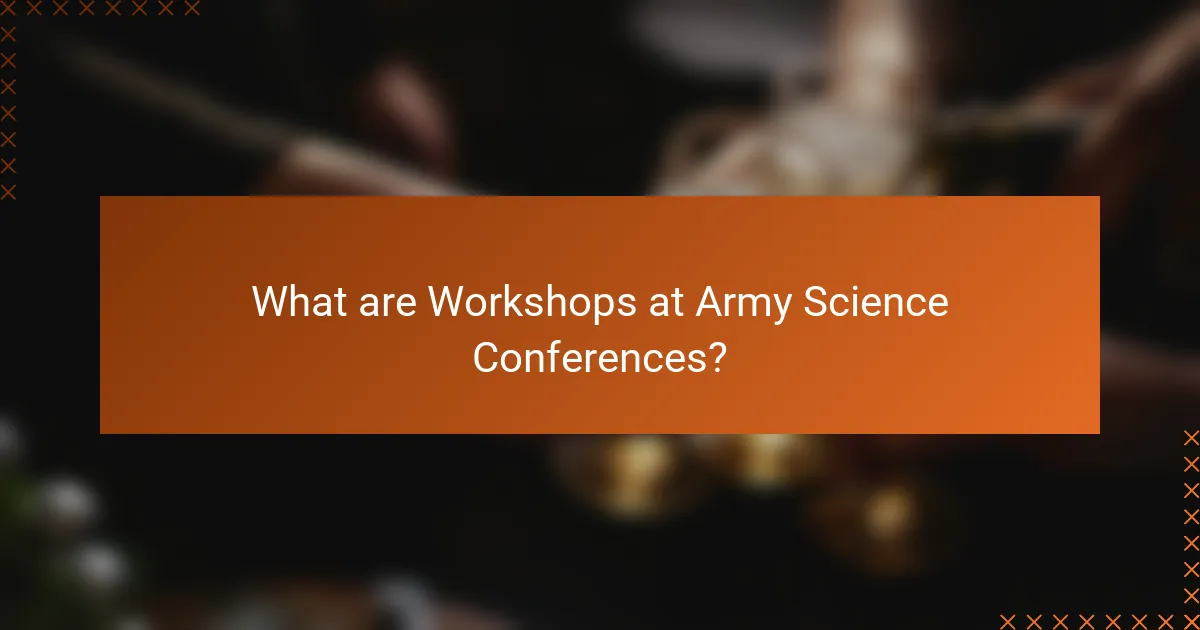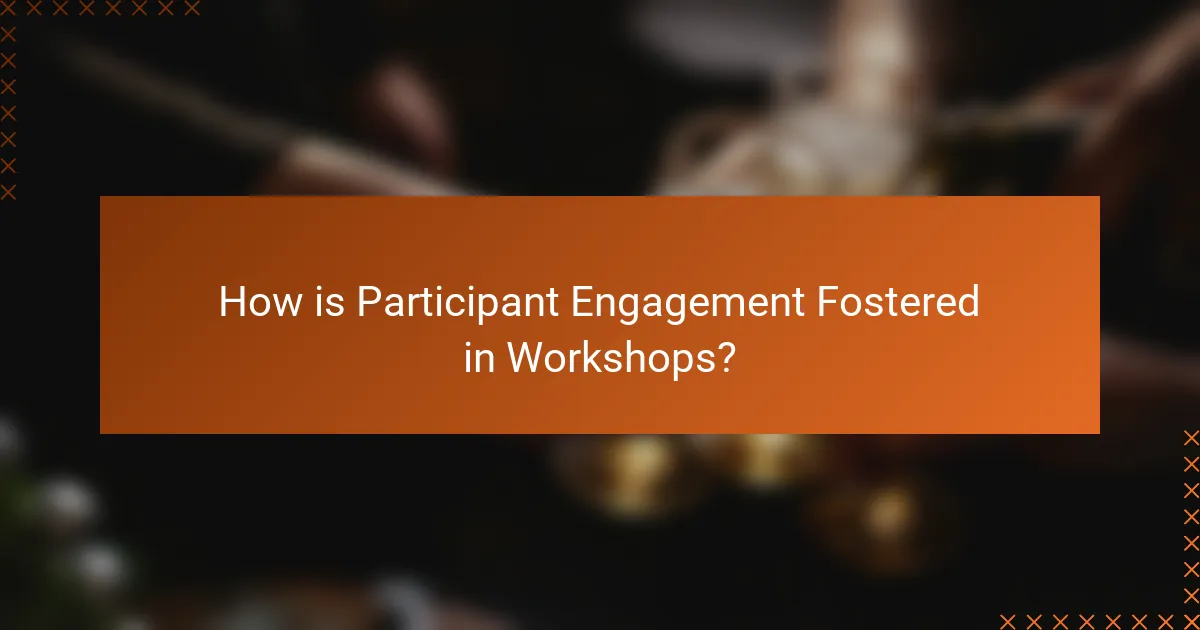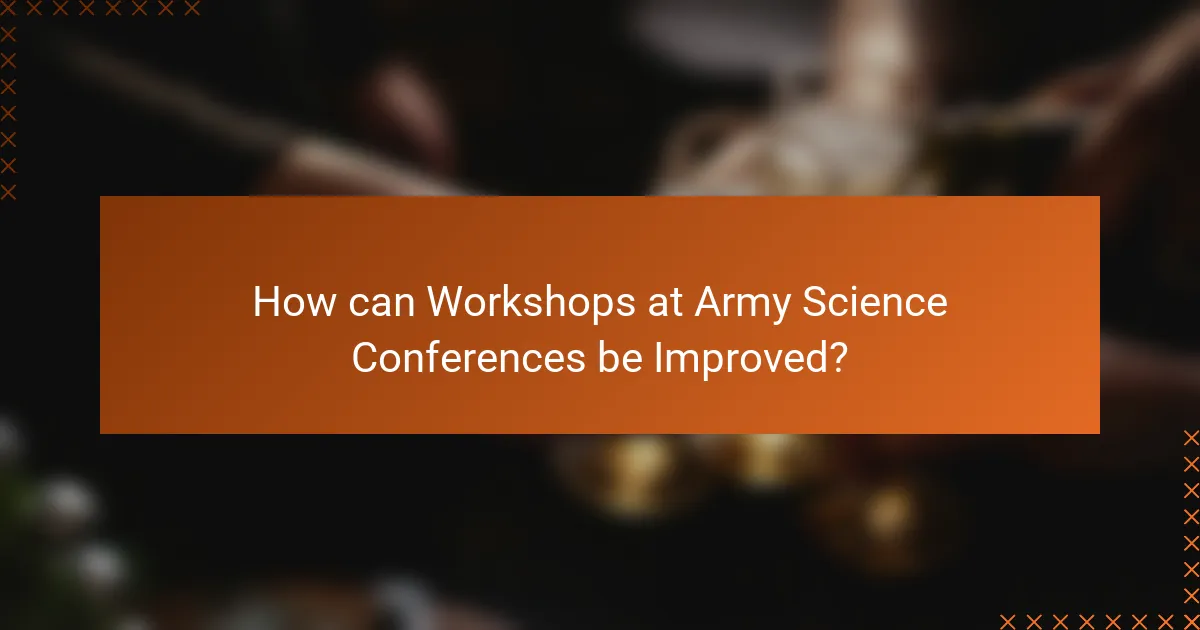Workshops at Army Science Conferences are interactive sessions aimed at enhancing participant engagement and learning in the fields of army science and technology. These workshops incorporate hands-on activities, discussions, and collaborative problem-solving to help attendees develop practical skills and knowledge applicable to their work. The format promotes networking opportunities and the exchange of innovative ideas, making workshops a crucial component of the conference experience. Strategies to improve participant engagement include the use of technology for real-time feedback, inviting diverse speakers, and providing clear objectives, all of which contribute to a more effective learning environment. Collecting feedback post-workshop is essential for informing future improvements and ensuring participant satisfaction.

What are Workshops at Army Science Conferences?
Workshops at Army Science Conferences are interactive sessions designed to enhance participant engagement and learning. They focus on specific topics relevant to army science and technology. Workshops typically involve hands-on activities, discussions, and collaborative problem-solving. Participants gain practical skills and knowledge applicable to their fields. The format encourages networking among attendees and experts. Workshops also facilitate the exchange of innovative ideas and solutions. They are an integral part of the conference, contributing to the overall educational experience.
How do Workshops contribute to Army Science Conferences?
Workshops contribute to Army Science Conferences by enhancing participant engagement and facilitating hands-on learning experiences. They provide a platform for attendees to collaborate on real-world problems. Workshops encourage knowledge sharing among experts and participants. They often focus on specific topics relevant to military science and technology. This targeted approach fosters in-depth discussions and problem-solving. Workshops also allow for practical demonstrations of new technologies or methodologies. Feedback gathered during these sessions can inform future research directions. Overall, workshops play a critical role in bridging theory and practice within the Army science community.
What is the purpose of Workshops in this context?
The purpose of workshops in this context is to facilitate interactive learning and engagement among participants. Workshops provide a platform for hands-on experiences and collaborative problem-solving. They enable attendees to apply theoretical knowledge in practical scenarios. This format enhances understanding and retention of complex topics. Workshops also foster networking opportunities among participants. They encourage the exchange of ideas and best practices. Research shows that interactive learning significantly improves knowledge acquisition. Overall, workshops are essential for maximizing participant engagement at Army Science Conferences.
How are Workshops structured within the conferences?
Workshops at conferences are structured to facilitate interactive learning and engagement. Each workshop typically begins with a brief introduction by the facilitator. This is followed by a presentation of key concepts and objectives. Participants are then divided into smaller groups for hands-on activities. These activities encourage collaboration and practical application of the concepts discussed. Feedback sessions are often included to allow participants to share insights and experiences. Finally, workshops conclude with a summary and Q&A session to reinforce learning outcomes. This structure promotes active participation and enhances the overall learning experience.
What Formats are Commonly Used in Workshops?
Common formats used in workshops include lectures, hands-on activities, group discussions, and breakout sessions. Lectures provide foundational knowledge on specific topics. Hands-on activities allow participants to apply concepts in practical scenarios. Group discussions facilitate peer-to-peer learning and idea exchange. Breakout sessions encourage focused conversations on specialized subjects. These formats promote engagement and enhance learning outcomes. Research shows that active participation increases retention and understanding of material.
What types of interactive formats are utilized?
Workshops at Army Science Conferences utilize various interactive formats. These formats include hands-on activities, group discussions, and case studies. Participants engage in collaborative problem-solving exercises. Interactive presentations with real-time feedback are also common. Breakout sessions allow for smaller group interactions. Simulation-based learning is utilized to enhance practical skills. Networking opportunities foster connections among attendees. These formats promote active learning and participant engagement.
How do panel discussions differ from hands-on workshops?
Panel discussions involve multiple experts sharing insights on a topic. They typically feature a moderator guiding the conversation. Participants mainly listen and ask questions. In contrast, hands-on workshops focus on active participation. Attendees engage in practical activities and learn through direct experience. Workshops emphasize skill development and application. Panel discussions are more about information exchange and perspectives. Research indicates that workshops can enhance retention of information through active learning techniques.
What Learning Outcomes can Participants Expect?
Participants can expect to gain practical skills and knowledge applicable to their field. They will learn about current research and innovations in military science. Workshops will provide hands-on experience with new technologies and methodologies. Participants will also improve their problem-solving and critical thinking abilities. Networking opportunities will enhance collaboration with peers and experts. Feedback from facilitators will guide personal and professional development. Overall, attendees will leave with actionable insights and enhanced competencies relevant to their roles.
How do Workshops enhance participants’ knowledge and skills?
Workshops enhance participants’ knowledge and skills through interactive learning experiences. They provide hands-on activities that promote practical application of concepts. Participants engage in discussions that foster critical thinking and collaboration. Workshops often feature expert facilitators who share industry insights and best practices. This exposure helps participants stay current with trends and technologies. Research shows that active learning environments improve retention rates. A study by Freeman et al. (2014) found that students in active learning settings performed better than those in traditional lectures. Overall, workshops create a dynamic space for skill development and knowledge acquisition.
What specific competencies are developed through these Workshops?
Workshops at Army Science Conferences develop several specific competencies. Participants enhance their critical thinking skills through problem-solving activities. Communication skills are improved via collaborative discussions and presentations. Technical proficiency is gained through hands-on experiences with new technologies. Leadership abilities are fostered by engaging in group projects and team dynamics. Networking skills are cultivated by interacting with peers and experts in the field. Adaptability is developed through exposure to diverse topics and methodologies. These competencies are essential for effective participation in military and scientific environments.

How is Participant Engagement Fostered in Workshops?
Participant engagement in workshops is fostered through interactive activities and collaborative learning. Facilitators use techniques like group discussions, hands-on exercises, and breakout sessions to encourage participation. These methods create an environment where attendees feel comfortable sharing ideas. Research shows that active participation increases retention of information. Additionally, incorporating technology, such as polls and live feedback, enhances engagement. Providing clear objectives and relevant content also keeps participants focused and involved. Workshops that allow for networking opportunities further strengthen engagement. Overall, these strategies contribute to a more dynamic and effective learning experience.
What strategies are employed to engage participants?
Interactive discussions are a primary strategy employed to engage participants. These discussions encourage active participation and sharing of ideas. Workshops often incorporate breakout sessions for small group interactions. This format fosters collaboration and deeper engagement. Hands-on activities are also utilized to enhance learning experiences. Participants can apply concepts in real-time, solidifying their understanding. Additionally, facilitators use real-world scenarios to make content relatable. This approach increases relevance and interest among attendees. Surveys and feedback mechanisms are implemented to gather participant insights. This data helps tailor future workshops to meet participant needs effectively.
How does the use of technology impact participant interaction?
The use of technology enhances participant interaction by facilitating communication and collaboration. Digital tools enable real-time feedback during workshops. Participants can engage through chat functions, polls, and Q&A sessions. This interaction fosters a more inclusive environment. Technology also allows for the sharing of resources and information instantly. Virtual platforms can connect participants from diverse locations. Studies show that technology-driven workshops lead to increased engagement and satisfaction. For example, a survey by the American Society for Training and Development indicated that 87% of participants felt more connected through technology.
What role do facilitators play in enhancing engagement?
Facilitators play a crucial role in enhancing engagement during workshops. They create an inclusive environment that encourages participation. Facilitators guide discussions and activities, ensuring all voices are heard. They employ various techniques to stimulate interaction and collaboration among participants. Research shows that effective facilitation can increase participant satisfaction and learning outcomes. For instance, a study by the International Association of Facilitators found that skilled facilitators improve group dynamics and foster deeper connections. This ultimately leads to a more engaged and productive workshop experience.
What are the Challenges in Ensuring Engagement?
Engagement in workshops at Army Science Conferences faces several challenges. One major challenge is participant motivation, which can vary significantly among attendees. Diverse backgrounds and interests lead to differing levels of enthusiasm. Another challenge is the effectiveness of the workshop format. Traditional lecture styles may not foster interaction, reducing engagement. Additionally, time constraints limit opportunities for in-depth discussions and activities. The complexity of topics can also overwhelm participants, leading to disengagement. Finally, inadequate facilitation can hinder group dynamics, impacting overall engagement. These factors collectively contribute to the difficulties in achieving high levels of participant engagement in workshops.
What common obstacles do organizers face?
Organizers of workshops at Army Science Conferences face several common obstacles. Limited funding often restricts resource allocation. Scheduling conflicts can hinder participation from key stakeholders. Technical issues may arise with presentation equipment or software. Engagement levels can vary among participants, impacting learning outcomes. Additionally, unclear objectives may lead to misaligned expectations. Lastly, logistical challenges, such as venue selection and catering, can complicate the planning process. These obstacles are frequently documented in event management literature, highlighting their prevalence in similar contexts.
How can these challenges be effectively addressed?
Challenges in workshops at Army Science Conferences can be effectively addressed through structured planning and participant feedback. Implementing clear objectives for each workshop ensures focus and relevance. Utilizing diverse formats, such as hands-on activities and discussions, enhances engagement. Regularly collecting participant feedback allows for real-time adjustments and improvements. Training facilitators in effective communication fosters a supportive learning environment. Incorporating technology can streamline interactions and resource sharing. Finally, establishing follow-up mechanisms ensures ongoing engagement and knowledge retention. These strategies create a more effective and impactful workshop experience.

How can Workshops at Army Science Conferences be Improved?
Workshops at Army Science Conferences can be improved by enhancing participant engagement and interactivity. Incorporating hands-on activities encourages active learning. Utilizing technology for real-time feedback can help tailor sessions to audience needs. Inviting diverse speakers brings varied perspectives and expertise. Structuring workshops with clear objectives aids in focused discussions. Providing post-workshop resources reinforces learning and application. Collecting participant feedback after each session informs future improvements. Research indicates that interactive formats increase retention and satisfaction among attendees.
What best practices can enhance Workshop effectiveness?
Clear objectives enhance workshop effectiveness. Defining specific goals helps participants understand expectations. Engaging facilitators foster active participation. Skilled leaders encourage discussion and collaboration. Interactive activities boost learning retention. Incorporating feedback mechanisms allows for continuous improvement. Research indicates that workshops with structured agendas increase participant satisfaction. Studies show that varied teaching methods cater to diverse learning styles, enhancing overall effectiveness.
How can feedback from participants be utilized for improvement?
Feedback from participants can be utilized for improvement by analyzing their responses to identify strengths and weaknesses in workshop formats. This analysis allows organizers to make data-driven decisions for future events. For example, specific feedback on session content can reveal what topics resonate most with participants. Additionally, suggestions for improvement can guide adjustments in teaching methods or materials used. Implementing these changes can enhance participant engagement and learning outcomes. Research shows that iterative feedback loops lead to better program effectiveness. A study by the American Society for Training and Development found that organizations that systematically collect and act on feedback see a 30% increase in participant satisfaction.
What innovative approaches can be integrated into future Workshops?
Integrating technology-driven interactive formats can enhance future Workshops. Utilizing virtual reality (VR) can create immersive learning experiences. Augmented reality (AR) can provide real-time information overlays during hands-on activities. Incorporating gamification elements can increase participant engagement and motivation. Collaborative online platforms can facilitate remote contributions and discussions. Data analytics can help tailor content to audience needs. Peer-to-peer learning sessions can promote knowledge sharing among participants. These innovative approaches have been shown to improve learning outcomes and participant satisfaction at similar events.
What Resources are Available for Organizing Effective Workshops?
Resources for organizing effective workshops include planning guides, templates, and online tools. Planning guides offer structured approaches to workshop design and execution. Templates help streamline the creation of agendas and materials. Online tools facilitate registration, communication, and feedback collection. Examples of these tools are Eventbrite for registration and Zoom for virtual meetings. Research shows that well-structured workshops lead to higher participant engagement and satisfaction. According to a study published in the Journal of Educational Psychology, effective workshop organization significantly enhances learning outcomes.
What tools can assist in planning and execution?
Project management software can assist in planning and execution. Tools like Trello, Asana, and Microsoft Project help organize tasks and timelines. They enable teams to collaborate effectively. Gantt charts in these tools visualize project schedules. Communication platforms like Slack enhance team interactions. File-sharing services like Google Drive streamline document management. Surveys and feedback tools gather participant insights post-workshop. Analytics tools measure engagement and learning outcomes effectively. These tools collectively support structured planning and successful execution of workshops.
How can collaboration with experts enhance Workshop content?
Collaboration with experts enhances workshop content by integrating specialized knowledge and practical insights. Experts bring real-world experience that enriches discussions. Their participation can elevate the credibility of the workshop. They can provide up-to-date information on current trends and technologies. This ensures that the content is relevant and actionable. Additionally, experts can facilitate interactive sessions that promote participant engagement. Their presence encourages networking opportunities among attendees. Research indicates that workshops with expert involvement yield higher satisfaction ratings from participants.
Workshops at Army Science Conferences serve as interactive sessions aimed at enhancing participant engagement and learning in military science and technology. These workshops involve hands-on activities, discussions, and collaborative problem-solving, allowing attendees to gain practical skills and knowledge. The structure of workshops includes various formats such as lectures, group discussions, and breakout sessions, all designed to foster active participation and networking among participants. Key learning outcomes include improved critical thinking, communication, and technical proficiency, while challenges such as participant motivation and effective facilitation are addressed through strategic planning and feedback mechanisms. Overall, workshops play a crucial role in bridging theory and practice within the Army science community.